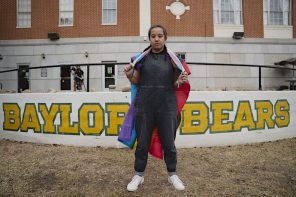National Public Radio generated lots of heat but little light with a segment on conversion therapy on Monday. Today, NPR’s ombudsman, Edward Schumacher-Matos, analyzed Monday’s story in light of the negative reaction from listeners. Briefly, Alix Spiegel interviewed Rich Wyler, founder of Journey into Manhood, and Peterson Toscano, a man who went spent 17 years in an unsuccessful effort to change his orientation.
Schumacher-Matos correctly points out that much of the negative reaction centered on the presentation of Wyler and Toscano as representative of two sides of a current debate in psychology. In fact, the official pronouncements of the mental health professions are clear that scientific evidence does not warrant psychologists telling a client that therapy can change orientation. In fairness, there are small groups of therapists associated with religious groups who question the APA’s findings. However, most of the therapists who argue with the APA are associated with churches and organizations which see homosexual behavior as immoral. There is debate but it is between the mental health establishment and a much smaller number of traditionally minded religious therapists.
However, even if Spiegel had correctly identified the nature and participants in the debate, she still would not have gotten it quite right. To his credit, Schumacher-Matos does a better job when he reviews material given to him by Spiegel and her editor Anne Gudenkauf. Among other things, Schumacher-Matos read an article by Mimi Swartz and published in the New York Times Magazine about same-sex attracted religious people who accept being same-sex attracted but do not identify as gay. I was quoted extensively in that piece and one of my former clients was interviewed for it. Here is what Schumacher-Matos surmises:
In 2009, a task force of the American Psychological Association came out clearly against trying to convert someone’s sexuality because of its harm and ineffectiveness; we are who we are and homosexuality is not something to “treat”. But at the same time, they acknowledged that acting on same-sex attractions is not appealing to all who have them. The task force supported “identity therapy” for some religious gay people. The idea is for a therapist to help a client find self-acceptance and – without forcing, encouraging or guiding someone to a particular sexual end – happiness, whether that might mean the client’s deciding to be in or out of the closet.
In some ways, the process is to help people prioritize their feelings. Those who become priests and nuns, for example, prioritize religion over sexuality.
All this suggests that what many people think of as “conversion” therapy is really not. The lines are blurry between conversion and identity therapy and between real and effective change in sexual orientation, identity and priority. A story that helps us understand the differences might uncover that in the public debate, many of us are talking past each other. I am curious, for example, to know what really it is that Bachman’s husband practices, or what kind of therapy Wyler underwent.
Schumacher-Matos is right; many of us are talking past each other because the media, in this case Alix Spiegel’s report, does not make these distinctions. Spiegel’s report is titled “Can Therapy Help Change Sexual Orientation?” The person who claimed to change runs a group called People Can Change and runs a weekend retreat using holding and touch along with highly active and emotive techniques (beating pillows to vicariously release aggression on parents) in order to change orientation. This is not what the New York Times article was about. In contrast to this report, the New York Times article generated no controversy or outrage.
If Spiegel wanted to report on people who accept their sexuality but live in such a way to honor their religious commitments then why interview a guy who promises that gays can change?
This is complicated. Wyler’s stated reason for wanting to change was to fit in better with his Mormon faith (Spiegel and Schumacher-Matos incorrectly identifies Wyler as “evangelical Christian”). However, the “identity therapy” (more completely sexual identity therapy) does not promote change of orientation and is largely consistent with the APA and other professional groups on the matter of the durability of sexual orientation.
For the most part, this is a religious debate. Some religious people think that the only way to fit in to a non-affirming religion is to change desires; others disagree asserting that desires rarely change much, and that living in accord with one’s religious beliefs is the proper aim. Change of orientation is not required for that. This “identity therapy” as Schumacher-Matos called it, is what the APA acknowledges as a proper way to recognize both the durability of sexual orientation as well as the importance of religious loyalties.
There are other problems with the NPR story which Schumacher-Matos still did not catch. For instance, the NPR ombudsman called Wyler’s therapy “a softer, conversational treatment that allowed him to return to his conservative Christian roots.” In addition to mislabeling Wyler’s church, Schumacher-Matos misunderstands Wyler’s therapy. At Religion Dispatches, Ted Cox and I gave brief descriptions of what Wyler now offers. Male leaders cuddling male participants like babies and vicariously beating their fathers into a pulp are not features I would associate with soft conversation. Wyler’s website notes that he went through similar holding therapy with his therapist and now co-partner in Journey into Manhood, David Matheson:
As we prepared to part ways, one time David had me lie down on the couch as he played soft music. Sitting behind me, he cradled my head and shoulders in his hands. “You ARE a man,” I heard his strong, deep voice affirming. “You are strong. You are powerful. You have broken the power that once tied you to your mother’s identity. You have proven yourself as a man among men. Men admire you and affirm you. You are one of them. You are a good and loving husband and father. You are whole. Not perfect, but you’re okay not being perfect. You are whole.”
While no doubt there was plenty of conversation in Wyler’s therapy, I believe Spiegel should have made listeners aware of the other methods used to seek orientation change.
In short, the story would have been much more helpful and accurate if Spiegel and Gunderhauf had investigated more fully and accurately the religious elements of the topic. There are many interesting and important aspects to this story that help illumine the interaction of sexuality and religion in personality. So the story is worth telling; and in this case definitely worth revisiting.




